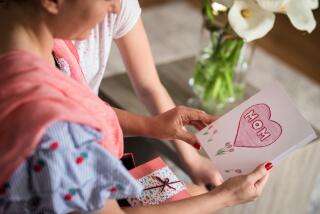There’s the royal baby, and then there’s the rest of us
- Share via
The countdown for the royal baby is on! Kim Kardashian’s baby arrived early! Jessica Simpson named her baby boy Ace! Take a cursory look at the celebrity magazines at the newsstand and it would appear we’re obsessed with pregnancies and babies.
The U.S. fertility rate tells another story.
It says we’re living vicariously through rich, famous people who can afford to have babies while the rest of us wait for the economy to recover to start families.
“The U.S. fertility rate has fallen sharply since the nation went into recession in 2007, hitting the lowest rate ever reported in 2011 and staying there in 2012,” reports Allison Linn in a piece for NBC’s “Today” show about how women are putting off having kids due to the unstable economy. She continues: “There were 63.2 births per 1,000 women ages 15 to 44 in 2012, according to the Centers for Disease Control, down from 69.3 births per 1,000 women in that age range in 2007.”
They say you’re never really ready to have a baby, that you have to do just do it. But in today’s economic climate, where everyone seems to have an uncertain future, having a baby might seem like too much of a risk. (See Diana Wagman’s Op-Ed, “Night terrors of the uninsured.”) Not only does it cost a lot to raise a family, but kids start costing significant amounts of money right out the womb.
“As noted in The Times recently, giving birth in the U.S. is more expensive than any other country in the world,” writes Eugene Declercq in an Opinion piece for CNN calling on the U.S. to “seriously rethink how we approach maternity care.” He writes that “total costs average $18,329 for a vaginal delivery and $27,866 for a C-section, with the bulk of the bill going to insurers. However, families with insurance still have to pay about $3,400 out of pocket.”
“During a recession, babies become a luxury item for the middle class,” argues Jezebel’s Erin Gloria Ryan. “Anecdotally, at least, it’s perfectly understandable why someone in my age and economic group — right smack dab in the middle of the babymaking years and raised right smack dab in the middle of the middle class — might put off having children until it doesn’t sound a lot like fiscal suicide.”
The good news, however, is that women may actually have more time to work on their careers (and, by default, hopefully, their sense of job security) without jeopardizing their chance of having a baby later on.
“Deep anxiety about the ability to have children later in life plagues many women. But the decline in fertility over the course of a woman’s 30s has been oversold,” writes Jean Twenge in the July/August issue of the Atlantic. “Baby panic,” she says, “is based largely on questionable data.” Wait, it gets better:
We’ve rearranged our lives, worried endlessly, and forgone countless career opportunities based on a few statistics about women who resided in thatched-roof huts and never saw a lightbulb. In [David] Dunson’s study of modern women, the difference in pregnancy rates at age 28 versus 37 is only about 4 percentage points. Fertility does decrease with age, but the decline is not steep enough to keep the vast majority of women in their late 30s from having a child.
This is, as the Huffington Post’s Margaret Wheeler Johnson puts it, the fertility story that “just told so many women what they want to hear.”
ALSO:
Abortion, a losing issue for Wisconsin Gov. Scott Walker
Is Ruth Bader Ginsburg too old to be a Supreme Court justice?
Follow Alexandra Le Tellier on Twitter @alexletellier
More to Read
A cure for the common opinion
Get thought-provoking perspectives with our weekly newsletter.
You may occasionally receive promotional content from the Los Angeles Times.










